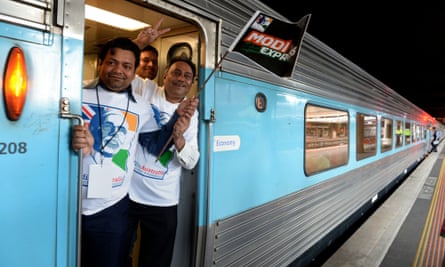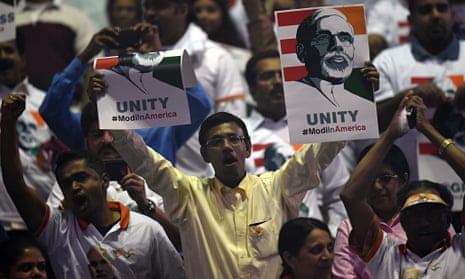For years, Indians viewed their countrymen who emigrated abroad for better opportunities with suspicion – as if they’d somehow betrayed the motherland. But with roughly 25 million people of Indian origin now scattered across the globe – including more than 3 million in the US – attitudes about the Indian diaspora are changing dramatically. And the country’s new government is looking at the huge expatriate population – second only to China’s – as a valuable component of India’s foreign policy, in much the same way the Jewish diaspora in the US influences international opinion and policy on Israel.
In recent months, the prime minister, Narendra Modi, has made a concerted effort to harness the energy and assets of Indian communities around the world. He started with flashy speeches in places such as New York’s Madison Square Garden and Allphones Arena in Sydney, aimed at turning every Indian abroad into an ambassador. Since then he has repeatedly urged the community abroad to contribute money, time and technical expertise to his signature programmes, including cleaning up the Ganges river, making India garbage-free and building rural toilets. He called upon Indians living abroad to urge families in their adopted countries to visit India every year to boost tourism, and he asked organisers of the Madison Square Garden event last autumn to donate $30,000 to Indian villages.
During Modi’s meeting with President Barack Obama in Delhi last month, Obama announced a new public-private partnership – The Indian Diaspora Investment Initiative – aimed at helping Indian Americans invest in India.
“We are changing the contours of diplomacy and looking at new ways of strengthening India’s interests abroad,” said Ram Madhav, general secretary of the ruling Bharatiya Janata party (BJP). “They can be India’s voice even while being loyal citizens in those countries. That is the long-term goal behind the diaspora diplomacy. It is like the way the Jewish community looks out for Israel’s interests in the United States.”
Before Modi, Indian embassies abroad would organise formal receptions with a few dozen prominent Indians when prime ministers visited. But Modi prefers to reach out to larger numbers cutting across age, occupation and income. In New York in September, hundreds of Indians lined up on the streets to catch a glimpse of Modi, shake hands and take selfies with him.
“You play a key role in shaping a positive image of India not just in America but also around the world,” Modi told a rapturous crowd of more than 22,000 Indians cheering and chanting at Madison Square Garden. About 20 members of Congress attended the event, which pleased many in Modi’s political party here because they hoped it would help create politically assertive Indian communities abroad.
These events have added a new dimension to India’s foreign policy, said Syed Akbaruddin, spokesman at India’s ministry of external affairs.
“Our soft power diplomacy now goes beyond books, culture and films. We now have the potential to engage large numbers of people abroad directly,” Akbaruddin said.
Some, however, think Modi may be overestimating the role of the diaspora and putting too much emphasis on Indians living in western countries.
“There is now a consensus that the Indian diaspora community can play a constructive role, but under Modi we are overstating their importance and their clout. Their contribution so far has been largely intangible,” said Pranay Sharma, foreign policy editor of Outlook, an Indian weekly news magazine. “We should know how to use them but also know when to maintain a distance. Otherwise it can cloud our foreign policy goals.”
Modi’s government has announced measures to link the diaspora to its foreign policy outreach.

For the first time, India’s foreign minister is focusing on Indian affairs overseas. The government has decided on a single identity card to make it easier for the diaspora to connect with the homeland, secure lifelong Indian visas, avoid checks at local police stations during visits, and own land. India also allowed visitors from 43 countries, including the United States, Australia and Fiji, to receive visas upon arrival, replacing the previous process, which took weeks. Modi’s government is also following up on the recent supreme court ruling to allow Indian citizens living abroad to vote in Indian elections.
Now many say they feel closer to India. “Many of us in the diaspora who felt like a severed entity felt reconnected to the Indian mothership when Narendra Modi reached out and embraced us the way he did in New York,” said Saureen Shah, a 33-year-old engineer and Indian-American citizen in San Francisco who came to India to work for Modi’s election campaign last year. “It was like pressing the restart button in our relationship with India.”
Modi’s affinity for the diaspora is not just strategic, but also personal.
In 2005, the US government denied him a visa on the grounds that he had committed “severe violations of religious freedom” because he failed to stop Hindu-Muslim riots in 2002 when he was the chief minister of the state of Gujarat. It was only after Modi became the prime minister last year that he could visit the US. But during the long years of visa denial, diaspora Indians were his most ardent advocates. Shah began working on creating Modi’s brand strategy online in 2010, before the 2014 elections.
In many ways Modi’s speech in New York was a show of gratitude.
“The Indian-American community here stood behind him like a rock. Many of us here felt the denial of a visa was unjust. He was viewed as the underdog,” said Bharat Barai, a doctor in Chicago who left India in 1976.
But not all Indians in the US are Modi supporters. In 2013, an invitation to Modi to address students at the Wharton School via Skype stirred controversy after Indian-American activists launched an online campaign against him because of his Hindu nationalist politics. The invitation was rescinded.
Modi also has faced criticism at home for his wide-ranging travel in his early months in office, including showy events in the United States and elsewhere.
The Hindu nationalist BJP has traditionally had close ties with Indians abroad as part of its vision of a grand Indian civilization with global footprints. When the party was in power earlier, they launched an ambitious annual event called Pravasi Bharatiya Divas (Overseas Indian Day) in 2003. Last month, 9,000 people of Indian origin from around the world came to Gujarat to attend the event.
Modi’s colleagues in the BJP say they want members of the diaspora to be local ambassadors and even cheerleaders of Modi’s government with their local neighbours, media and legislators.
“They can tell them about the good changes taking place in India and remove the image of India as an inefficient place to visit and invest in,” said Vijay Chauthaiwale, who heads Overseas Friends of BJP.
This article appeared in Guardian Weekly, which incorporates material from the Washington Post

Comments (…)
Sign in or create your Guardian account to join the discussion